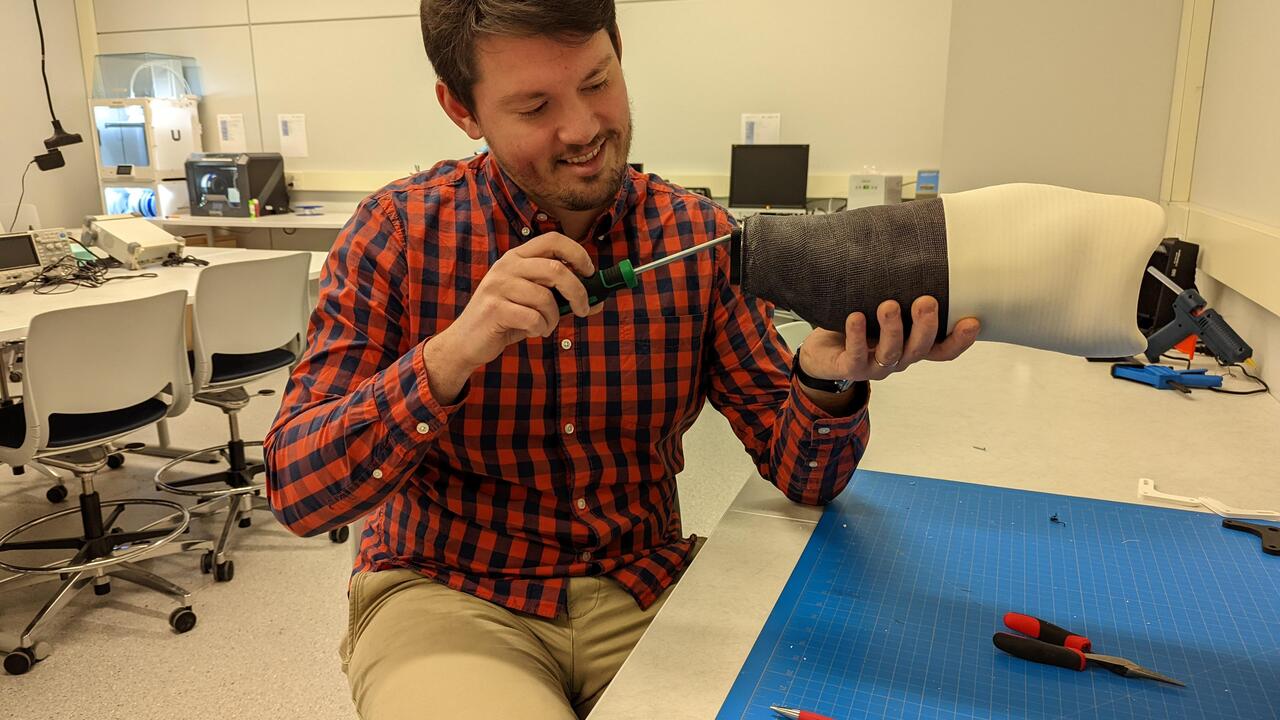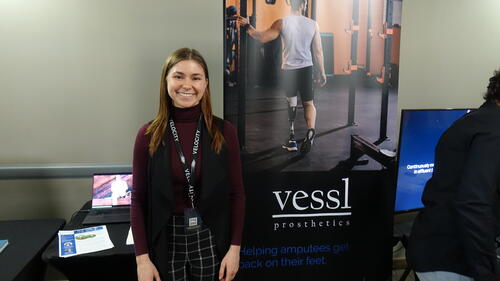
Velocity company Vessl Prosthetics sees inclusion as key to product design
Company working with amputees to make ‘a fulfilling life more comfortable’

Company working with amputees to make ‘a fulfilling life more comfortable’
By Jon Parsons University RelationsA Velocity health-technology startup is designing a new kind of self-adjusting socket for prosthetics.
The company, Vessl Prosthetics, identified a common concern for many amputees who use prostheses – poor socket fit. As Vessl’s CEO and co-founder Sydney Robinson explains, the limb inside the prosthetic can shrink throughout the day. For many amputees, that can mean a poor fit and discomfort.
“The socket we’re designing has inner panels that allow for expansion and constriction around the limb,” Robinson says. “If the limb isn’t changing size, then nothing changes. But if it is changing, our socket will allow for gradual and continuous constriction onto the limb to maintain a snug fit.”
Vessl takes a principled approach to inclusive research and product development, working closely with amputees, amputee organizations and prosthetists at every step. As Robinson says, it would not make much sense to design a product for amputees without first knowing that amputees want the product.
“Part of it goes back to my training in biomedical engineering,” she continues. “In one of our courses, we were paired with someone from the community who required an assistive device. They explained a problem they had and then we tried to innovate a solution.”

Sydney Robinson, CEO and co-founder of Vessl Prosthetics, pictured here at the recent Velocity Health launch event.
The same inclusive approach animates work at Vessl Prosthetics. To understand the lived experience of amputees, the team consulted with amputees and with amputee organizations like the prosthetics clinics at Veterans Affairs in the United States.
“We also conducted an online survey and spoke to many other amputees in one-off conversations,” Robinson says. “One organization we spoke to was the Amputee Coalition of Toronto.”
One key insight the Vessl team identified is that poor socket fit is a major concern for amputees who use prostheses. It is not simply a matter of putting on the prosthesis and everything is good to go. Even a minor misfit or imbalance can become a major discomfort when a prosthesis is worn for an extended period.
In fact, as Robinson explains, some amputees will give up on using prostheses precisely because of the discomfort, or because of the inconvenience of having to constantly adjust the fit throughout the day.
“A lot of amputees use what are called prosthetic socks,” Robinson says. “Their leg typically shrinks throughout the day. So, they’re dealing with less volume in the socket, and they have to put on another sock. They’ll do that periodically, so that by the end of the day some people are wearing like ten socks. It’s an archaic solution to a problem, and obviously very frustrating.”
Another stakeholder Vessl includes in its processes is prosthetists — professionals making prostheses for amputees. Robinson notes that prosthetists provided valuable insights about design, such as thinking about weight distribution in the socket.
“Any weight on the distal end or on the bottom of the socket will be perceived higher because it’s further away from the centre of the body. But if you put those heavier components near the upper part of the leg, amputees won’t notice the weight as much.”
As part of its commitment to inclusion, Vessl is a company that is invested in authentically understanding the experiences of amputees. That means not seeing amputees as having tragic or unfulfilling lives.
“We recognize that many amputees already have very fulfilling lives,” Robinson continues. “We recognize that a lot of amputees have meaningful connections and engage meaningfully in their community. Their disability or their amputation does not hinder that in the slightest. So, it’s not that we’re trying to make their life fulfilling. We just want to make that a more comfortable experience for them.”
Velocity helps founders grow faster and farther, from idea to Series A and beyond. Since 2008, Velocity has supported over 400 startups that raised over $4.3 billion USD in capital, generated over $26 billion in enterprise value, and created over 5,000 jobs. Visit the Velocity website to learn more. Velocity Health is funded in part by the Government of Canada through the Federal Economic Development Agency for Southern Ontario (FedDev Ontario).

Read more
New initiative linked to the Velocity entrepreneurship ecosystem to support health-tech startups

Read more
Velocity company reduces risk to clinical staff injury and increases patient dignity

Read more
Velocity alumni return to guide the next generation of founders
The University of Waterloo acknowledges that much of our work takes place on the traditional territory of the Neutral, Anishinaabeg, and Haudenosaunee peoples. Our main campus is situated on the Haldimand Tract, the land granted to the Six Nations that includes six miles on each side of the Grand River. Our active work toward reconciliation takes place across our campuses through research, learning, teaching, and community building, and is co-ordinated within the Office of Indigenous Relations.